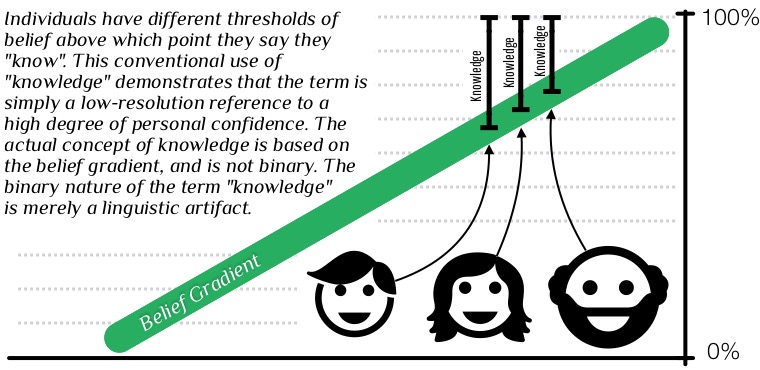 What is knowledge? Since language is not privately owned, but instead belongs to convention, we merely need to uncover the language community’s use of “knowledge” to determine its conventional meaning.
What is knowledge? Since language is not privately owned, but instead belongs to convention, we merely need to uncover the language community’s use of “knowledge” to determine its conventional meaning.
Most all of us claim we “know” our birthdays, in spite of admitting there is a small chance we could be wrong due to a clerical error on our birth certificates, or due to our parents lying or forgetting. We can all imagine parents conspiring with the doctor to nudge the date to April 2nd if their child was actually born April 1st at 11:55 pm.
Most all of us occasionally claim we “know” it will rain tomorrow after hearing rain predicted by several media sources. We all admit this is not fully certain, but due to the track record of the sources, we would be surprised if they were wrong. So we say we “know” it will rain.
This is the conventional defining of “knowing”: a high degree of epistemic certainty based on reliable methods of inquiry that have consistently yielded accurate predictions.
But is there anything we know with absolute certainty? Imagine you are dreaming you are falling. You have no way of knowing with absolute certainty whether you actually are falling, but you can hardly be wrong about your perception that you are falling. We can be certain about our immediate perceptions, but we can not know with full certainty whether those perceptions correspond to anything in reality.
Philosophers spend much time and energy attempting to sort out what can and can not be known. They often stipulate a philosophical notion “knowledge” quite different from its conventional meaning. We should not let these stipulated philosophical definitions of “knowledge” ruin the conventional use of “knowledge”: a high, though not absolute, degree of certainty.
We claim we know something when our degree of confidence reaches a particular threshold of certainty along the gradient of certainty. This threshold is set by each individual, and is therefore not objective: it will vary from person to person. For all practical matters, this should not bother us. If we need more resolution as do scientists, we can simply employ more rigorous methods of inquiry to arrive at more precise terms such as “statistically significant”, “83% likely”, or a “5 sigma” confidence level.

So the linguistic term “knowledge” is binary, based on a subjectively defined threshold. However, the concept of knowledge is a sub-category of belief, and as such, is intrinsically based on the gradient of belief. Those who suggest the concept of knowledge is a binary on/off concept and is by definition infallible 1) have abandoned the context of conventional linguistic use and are stipulating a philosophical notion of belief, or 2) are misguided.

